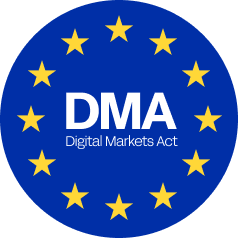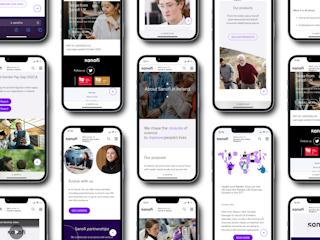maj 20, 2024
The healthcare industry is undergoing a seismic shift. Apple's recent policy update paves the way for healthcare companies across the EU to explore new avenues in app distribution. This change is a response to the European Digital Markets Act (DMA), aiming to foster a more competitive and innovative digital market.
Explainer: Understanding Apple's apps distribution in the European Union Announcement
Recently, Apple introduced significant updates to its app distribution policies specifically tailored for the European Union, in response to the Digital Markets Act (DMA). This change allows developers, including healthcare organizations, to offer apps through alternative platforms besides the traditional iOS App Store. Developers can now distribute their apps directly from their websites or through third-party app stores, providing more flexibility in how they reach users and offer services. This shift is designed to enhance competition and increase choices for consumers and developers by reducing dependency on Apple's App Store. For more details on this announcement, you can visit Apple’s official developer support page.

The new policy update from Apple is set to significantly streamline the app launch process for the healthcare industry. For those who have navigated the mobile app launch cycle, the complexity and time-consuming nature of the process are well-known. Traditionally, after a meticulous internal review, which includes Medical, Legal, and Regulatory (MLR) certification, the next hurdle is obtaining approval from the Apple App Store.
This approval step can be particularly strenuous, involving navigation through Apple's various regional compliance standards, which may interpret policies differently. This often means that while an app may smoothly pass the approval process in one region, it could face requests for additional information, revisions, or even outright rejection in another.
The new legislation marks a significant departure from traditional practices, giving the healthcare industry the liberty to directly offer their digital solutions through their websites, corporate app marketplaces, or partner platforms. The flexibility to provide iOS apps as direct downloads simplifies the deployment process, reducing dependence on traditional app stores and their varied regional compliance requirements. This approach sidesteps the diverse regional compliance challenges posed by traditional app stores. This shift towards direct distribution models grants the industry an unprecedented level of autonomy in delivering digital health solutions to the market.
Healthcare companies can now experiment with apps that integrate more deeply with new technologies, collect real-time data, and enhance patient engagement in ways that were previously constrained by the limitations of standard app stores.

Industry Application Example
Let's use a global healthcare company specializing in diabetes management as an example of what this new distribution model could mean in practical terms:
- HCP Digital Hub: A dedicated marketplace could host a suite of tailored apps. This controlled platform would offer tools for diabetes management, educational resources for healthcare professionals (HCPs), and collaborative platforms to facilitate treatment plans. This ecosystem supports a continuous care model, enhancing patient outcomes through integrated and accessible digital tools.
- Direct Distribution: By enabling direct app downloads from the company's website, the process becomes more straightforward for users. This eliminates the layers of navigation and approval typically associated with the App Store, making it faster and more efficient for HCPs and patients to get the resources they need.
- Hyper-Targeted Patient Engagement: With the ability to operate outside the App Store, the company can develop and distribute disease-specific tools directly to niche patient populations. This could include apps tailored for specific demographics or disease stages, enhancing personalization and effectiveness.
- Unleashing Innovation: The freedom from App Store constraints allows the company to rapidly deploy cutting-edge features in their apps, such as AI-driven predictive analytics, integration with wearable technologies, and real-time health monitoring, pushing the boundaries of what is possible in patient care and engagement.

Potential company Apps within the Healthcare industry
With the new app distribution capabilities, the healthcare companies have the ability to create a Hyper Patient/HCP Centric App Ecosystem with the ability to use a micro app ecosystem strategy to capture data and enhance patient experiences. Here are some specific applications that could be part of healthcare companies app Ecosystem:
- HCP Digital Learning App: This app would serve as an educational platform for healthcare professionals, providing them with the latest clinical research, interactive case studies, and continuing education courses. With content tailored to various specialties, the app could include multimedia modules for an engaging learning experience, self-assessment tools to track progress, and certifications upon completion of courses. The aim would be to keep HCPs abreast of the latest medical advancements and treatment methodologies, enabling them to deliver high-quality patient care.
- Chronic Disease Management Suites: These comprehensive apps can be designed to integrate with various medical devices, monitoring vital signs and managing medication for diseases like diabetes, hypertension, or heart conditions. For instance, within a diabetes management app, users can track blood glucose levels and insulin intake, receiving real-time lifestyle guidance for actionable insights. Such suites would enhance patient self-management and offer personalized care.
- AI-Powered Dosing Assistance Apps: Utilizing machine learning, these apps can analyze a spectrum of health data to suggest individualized medication dosages, improving treatment precision. In the context of hypertension management, for example, such an app would continuously monitor blood pressure levels to recommend adjustments in medication dosages. This technology could similarly be applied to dosing for various medications in different therapeutic areas, such as anticoagulants or asthma medications, where precise, real-time adjustments can significantly improve patient outcomes.
- HCP Treatment Management App: This could serve as a digital assistant for HCPs, offering quick access to drug databases, treatment guidelines, and patient management tools, simplifying and enhancing the care process.
- Secure Communication Platform: Such a platform would enable secure and efficient communication between HCPs and patients, supporting telemedicine and remote care models that are becoming increasingly prevalent.
- Patient Support and Community App: Focusing on community building and support, this app could connect patients with similar health conditions, providing a network of support, shared experiences, and motivation.
The changes in app distribution present a golden opportunity for all enterprise healthcare companies. By embracing alternative app marketplaces and creating robust app ecosystems, companies can lead the way in the digital transformation of healthcare. This shift not only promises enhanced patient engagement and improved treatment outcomes but also positions these companies at the forefront of healthcare innovation.
The time to act is now. Let's unlock the full potential of digital health, together, shaping a future where technology empowers better health for everyone.
The information provided in this article is for general informational purposes only, focusing on technology recommendations, and should not be considered legal advice. Laws and regulations vary by jurisdiction and may be subject to change. While we strive to keep our content accurate and up-to-date, we make no representations or warranties of any kind, express or implied, about the completeness, accuracy, reliability, suitability, or lawfulness with respect to the information contained on this article for any purpose. You should not rely solely on the recommendations as an indication of their lawfulness. We encourage you to consult with a qualified local attorney regarding the legality of the proposed recommendations in your area.






